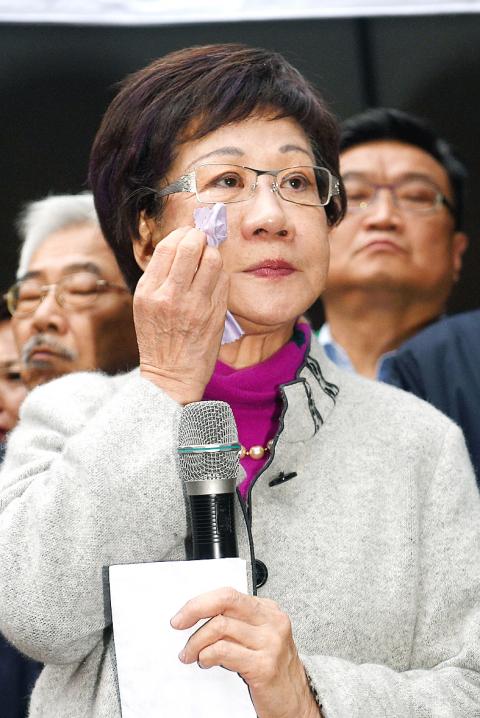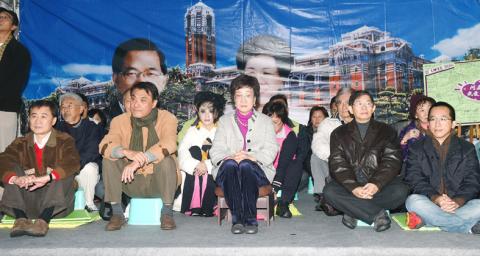Former vice president Annette Lu (呂秀蓮) began a hunger strike yesterday afternoon in support of the release of former president Chen Shui-bian (陳水扁), who has been in prison since 2008 and suffers from multiple mental and physical disorders.
Accompanied by Chen’s son, Chen Chih-chung (陳致中), his sisters, Chen Hsiu-ching (陳秀金) and Chen Hsiu-chin (陳秀琴), as well as Democratic Progressive Party (DPP) Secretary-General Joseph Wu (吳釗燮) and former minister of national defense Tsai Ming-shian (蔡明憲), Lu officially declared in front of the National Taiwan Museum that she would remain on a hunger strike until the government decides to release Chen Shui-bian.
Speaking at a news conference before retreating into a tent for the hunger strike, Lu accused the government of political interference in the judicial process and criticized what she called Chen Shui-bian’s inhumane treatment in prison and the rejection of his medical parole, which she said has contributed to the worsening of his mental and physical health to the degree that it is threatening his life.

Photo: Wang Min-wei, Taipei Times
“It’s because of these reasons that I am beginning a hunger strike,” she said.
Lu said the move was not only in support of Chen Shui-bian’s human rights, but also a gesture of her appreciation for Chen Shui-bian’s choice to make her vice president in the 2000 and 2004 presidential elections.
“Chen Shui-bian’s imprisonment has been a major cause of political polarization and releasing him could be a first step toward reconciliation and a brighter future for Taiwan,” Lu said, in tears as she spoke.

Photo: Wang Min-wei, Taipei Times
Chen Hsiu-chin said that as Lu is already in her 60s, “it is worrisome that she insists on going on a hunger strike in such cold weather.”
“I hereby call on [President] Ma [Ying-jeou, 馬英九] to let go of the hate that he harbors and let Chen Shui-bian go home,” she said.
Tsai also voiced concerns over Chen Shui-bian’s well-being, saying that the former president has said to him that if he dies in prison, “he would like to have his coffin paraded down Ketagalan Boulevard in front of the Presidential Office Building, before being taken to his home in Greater Tainan.”
Speaking on behalf of the DPP, Wu said: “Enough is enough,” calling on the government to release Chen Shui-bian immediately.

NATIONAL SECURITY THREAT: An official said that Guan Guan’s comments had gone beyond the threshold of free speech, as she advocated for the destruction of the ROC China-born media influencer Guan Guan’s (關關) residency permit has been revoked for repeatedly posting pro-China content that threatens national security, the National Immigration Agency said yesterday. Guan Guan has said many controversial things in her videos posted to Douyin (抖音), including “the red flag will soon be painted all over Taiwan” and “Taiwan is an inseparable part of China,” while expressing hope for expedited “reunification.” The agency received multiple reports alleging that Guan Guan had advocated for armed reunification last year. After investigating, the agency last month issued a notice requiring her to appear and account for her actions. Guan Guan appeared as required,

DAREDEVIL: Honnold said it had always been a dream of his to climb Taipei 101, while a Netflix producer said the skyscraper was ‘a real icon of this country’ US climber Alex Honnold yesterday took on Taiwan’s tallest building, becoming the first person to scale Taipei 101 without a rope, harness or safety net. Hundreds of spectators gathered at the base of the 101-story skyscraper to watch Honnold, 40, embark on his daredevil feat, which was also broadcast live on Netflix. Dressed in a red T-shirt and yellow custom-made climbing shoes, Honnold swiftly moved up the southeast face of the glass and steel building. At one point, he stepped onto a platform midway up to wave down at fans and onlookers who were taking photos. People watching from inside

A Vietnamese migrant worker yesterday won NT$12 million (US$379,627) on a Lunar New Year scratch card in Kaohsiung as part of Taiwan Lottery Co’s (台灣彩券) “NT$12 Million Grand Fortune” (1200萬大吉利) game. The man was the first top-prize winner of the new game launched on Jan. 6 to mark the Lunar New Year. Three Vietnamese migrant workers visited a Taiwan Lottery shop on Xinyue Street in Kaohsiung’s Gangshan District (崗山), a store representative said. The player bought multiple tickets and, after winning nothing, held the final lottery ticket in one hand and rubbed the store’s statue of the Maitreya Buddha’s belly with the other,

‘NATO-PLUS’: ‘Our strategic partners in the Indo-Pacific are facing increasing aggression by the Chinese Communist Party,’ US Representative Rob Wittman said The US House of Representatives on Monday released its version of the Consolidated Appropriations Act, which includes US$1.15 billion to support security cooperation with Taiwan. The omnibus act, covering US$1.2 trillion of spending, allocates US$1 billion for the Taiwan Security Cooperation Initiative, as well as US$150 million for the replacement of defense articles and reimbursement of defense services provided to Taiwan. The fund allocations were based on the US National Defense Authorization Act for fiscal 2026 that was passed by the US Congress last month and authorized up to US$1 billion to the US Defense Security Cooperation Agency in support of the